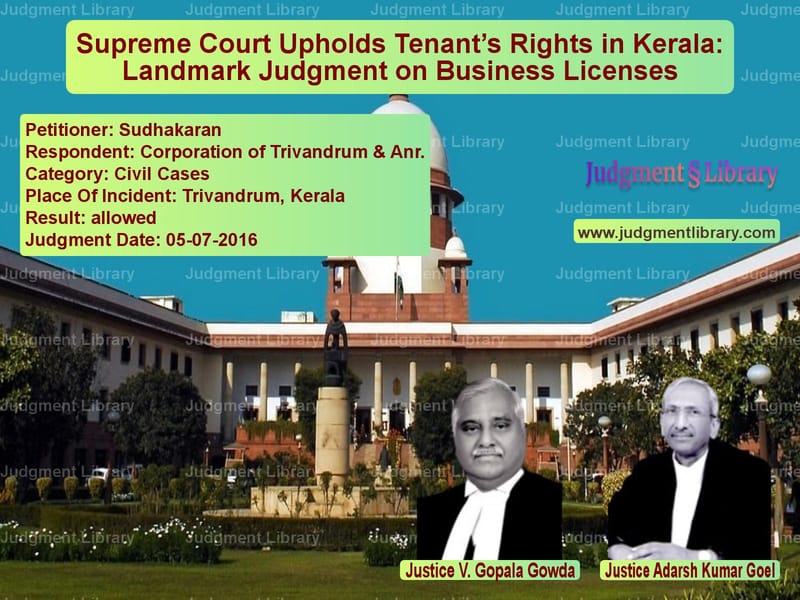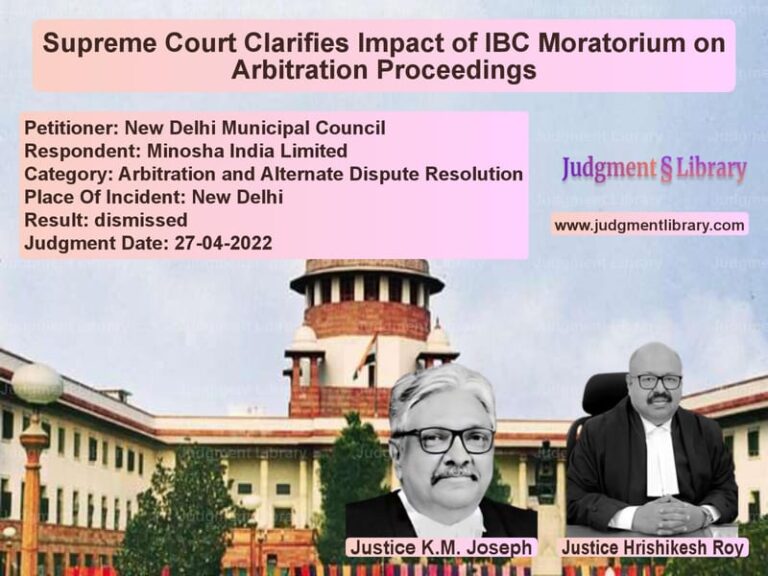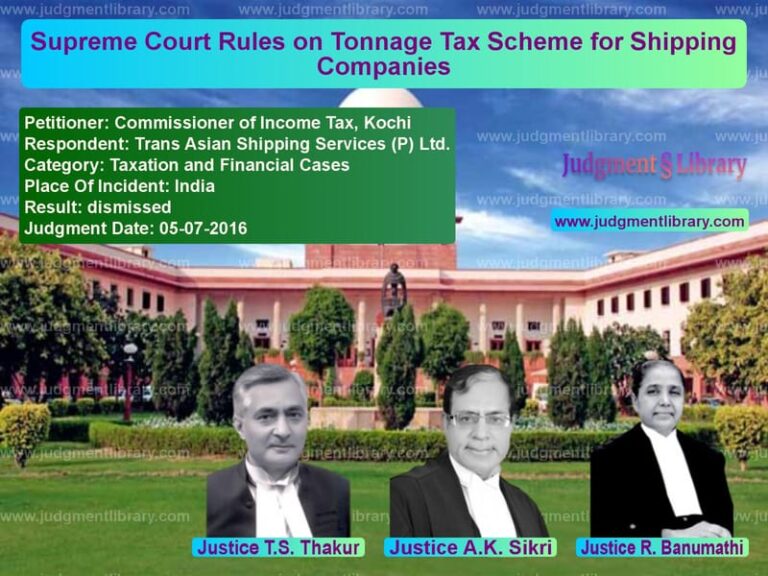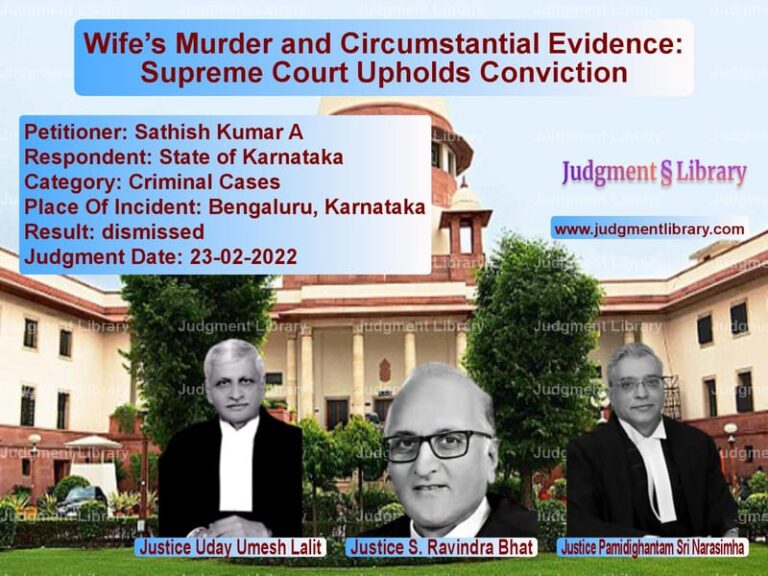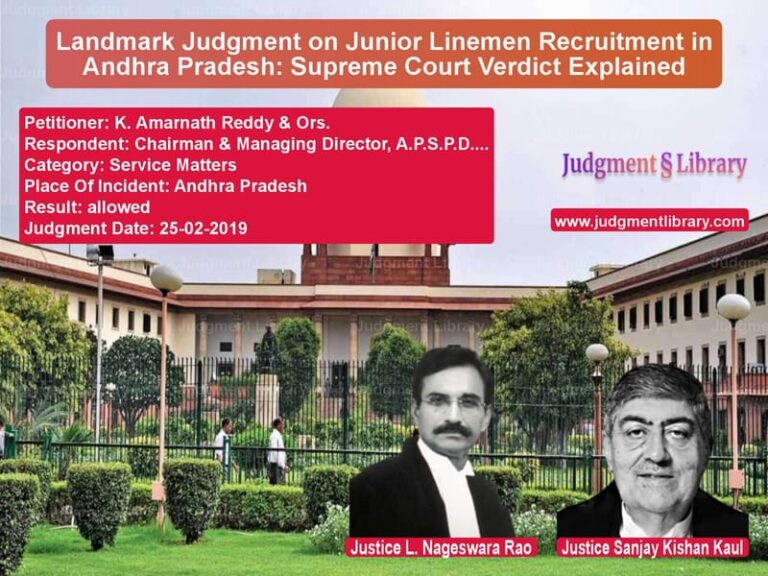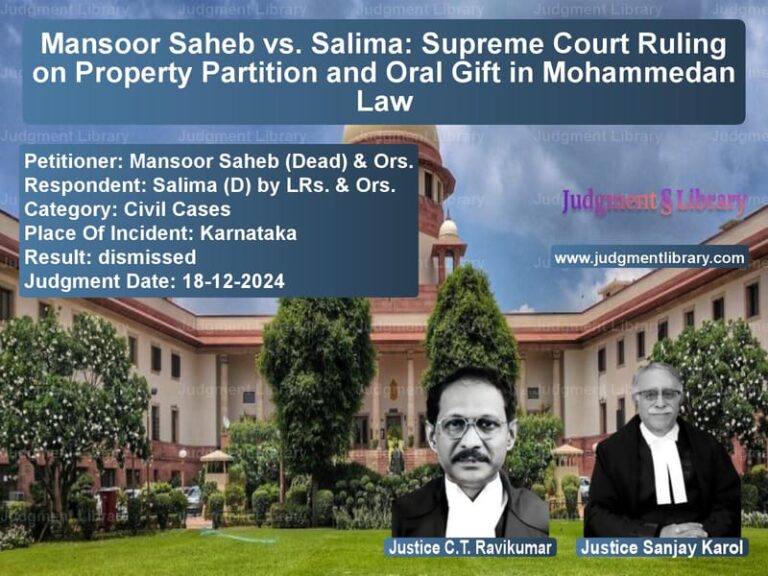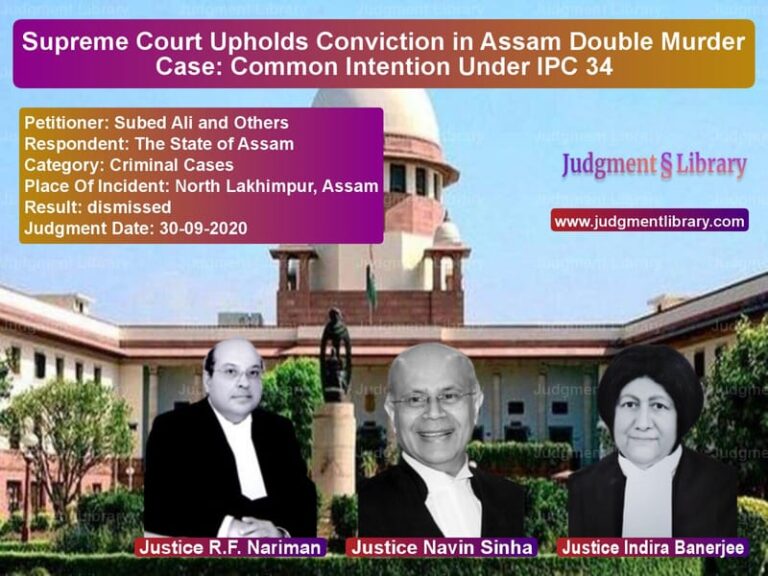Supreme Court Upholds Tenant’s Rights in Kerala: Landmark Judgment on Business Licenses
The Supreme Court of India, in a significant ruling in the case of Sudhakaran vs. Corporation of Trivandrum & Anr., addressed the issue of a tenant’s right to renew a business license without requiring fresh consent from the landlord. The case revolved around the interpretation of Section 492(3) of the Kerala Municipality Act, 1994, and its implications on statutory tenants operating businesses.
Background of the Case
The appellant, Sudhakaran, was a tenant running a hardware shop in a premises in Trivandrum since June 1, 2001. Initially, he was granted a business license with the consent of the landlord. However, when he applied for a renewal of his license, the Corporation of Trivandrum rejected his application on the grounds that he did not produce fresh consent from the landlord.
The case was taken to the Tribunal for Local Self Government Institutions, which ruled in favor of the tenant, stating that consent from the landlord was only required for obtaining a license for the first time and not for renewals. The Tribunal’s decision was upheld by a Single Judge of the Kerala High Court, but a Division Bench of the High Court later overturned this ruling, requiring the tenant to obtain fresh consent from the landlord for renewal.
The Supreme Court was tasked with deciding whether the interpretation of Section 492(3) of the Kerala Municipality Act justified the Division Bench’s ruling and whether a statutory tenant could be denied a business license renewal based on the landlord’s refusal to grant fresh consent.
Legal Issues Raised
- Whether a tenant requires fresh consent from the landlord for the renewal of a business license under Section 492(3) of the Kerala Municipality Act.
- Whether a statutory tenant under the Kerala Buildings (Lease and Rent Control) Act, 1965, can be denied a business license renewal based on the landlord’s refusal to provide fresh consent.
- Whether the Division Bench of the Kerala High Court erred in requiring fresh consent for renewal.
Arguments of the Petitioner (Sudhakaran)
The petitioner, Sudhakaran, argued the following:
- Under Section 492(3) of the Kerala Municipality Act, landlord consent is only required for obtaining a business license for the first time, not for renewal.
- He had been a lawful tenant since 2001 and had been running his business legally with the landlord’s original consent.
- Once a business license is issued, its renewal should not be contingent upon fresh consent from the landlord, as this would give landlords undue control over tenants.
- The Division Bench’s ruling went against the legislative intent of the Kerala Municipality Act and undermined tenants’ rights under the Kerala Buildings (Lease and Rent Control) Act.
Arguments of the Respondents (Corporation of Trivandrum & Landlord)
The respondents, including the Corporation of Trivandrum and the landlord, presented the following arguments:
- The original license granted to the petitioner had expired, and as per the Kerala Municipality Act, any new license application required fresh consent from the landlord.
- The Division Bench correctly interpreted the law, stating that once a license expires, any further application is treated as a fresh application, necessitating landlord consent.
- Allowing tenants to renew business licenses without fresh consent would infringe upon the property rights of landlords.
- The High Court’s Division Bench ruling ensured that landlords retained control over how their properties were used.
Supreme Court’s Observations
The Supreme Court analyzed the provisions of the Kerala Municipality Act and the Kerala Buildings (Lease and Rent Control) Act and made the following key observations:
- “The requirement of consent under Section 492(3) applies only to new applications for a business license, not renewals.”
- “A statutory tenant under the Kerala Buildings (Lease and Rent Control) Act cannot be arbitrarily deprived of the ability to continue a lawful business merely because a landlord refuses consent.”
- “The Division Bench’s ruling misinterpreted the provisions of the Kerala Municipality Act by extending the requirement of fresh consent to license renewals.”
- “The law protects tenants from arbitrary eviction, and a business license renewal should not be used as a tool for eviction through indirect means.”
Key Extracts from the Judgment
The Supreme Court ruled:
“The statutory provision already quoted above shows that the requirement of consent of the landlord is applicable only when a person intends to obtain a license for the first time. Renewal or subsequent application for obtaining a license on expiry of the period of the existing license, during the currency of the tenancy, is not applicable for obtaining a license.”
Additionally, the Court observed:
“A valid tenancy itself has implied authority of the landlord for legitimate use of the premises by the tenant.”
Final Judgment
The Supreme Court ruled in favor of the tenant, issuing the following directives:
- The appeal by Sudhakaran was allowed, and the order of the Division Bench was set aside.
- The ruling of the Tribunal and the Single Judge of the Kerala High Court was reinstated.
- The Corporation of Trivandrum was directed to renew the business license of the appellant without requiring fresh consent from the landlord.
- Landlords cannot deny tenants the ability to renew their licenses as long as they remain lawful tenants under the Kerala Buildings (Lease and Rent Control) Act.
Impact of the Judgment
This ruling has several implications:
- It strengthens the rights of tenants in commercial rental agreements.
- It prevents landlords from using business license renewal as a means of evicting tenants.
- It clarifies the application of Section 492(3) of the Kerala Municipality Act, protecting businesses from arbitrary interference.
- It reaffirms the importance of statutory protection for tenants under the Kerala Buildings (Lease and Rent Control) Act.
Conclusion
The Supreme Court’s decision in Sudhakaran vs. Corporation of Trivandrum & Anr. is a landmark judgment that protects tenant rights in business operations. By ruling that fresh consent from landlords is not required for business license renewals, the Court has ensured that statutory tenants are not subjected to arbitrary eviction tactics. This ruling strengthens the legal framework for commercial tenancies in Kerala and upholds the principles of fairness and justice in landlord-tenant relations.
Don’t miss out on the full details! Download the complete judgment in PDF format below and gain valuable insights instantly!
Download Judgment: Sudhakaran vs Corporation of Triva Supreme Court of India Judgment Dated 05-07-2016-1741873125759.pdf
Direct Downlaod Judgment: Direct downlaod this Judgment
See all petitions in Landlord-Tenant Disputes
See all petitions in Judgment by V. Gopala Gowda
See all petitions in Judgment by Adarsh Kumar Goel
See all petitions in allowed
See all petitions in supreme court of India judgments July 2016
See all petitions in 2016 judgments
See all posts in Civil Cases Category
See all allowed petitions in Civil Cases Category
See all Dismissed petitions in Civil Cases Category
See all partially allowed petitions in Civil Cases Category

